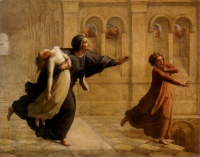Nightmare
From The Art and Popular Culture Encyclopedia
| Revision as of 08:56, 7 February 2014 Jahsonic (Talk | contribs) ← Previous diff |
Revision as of 08:13, 31 December 2015 Jahsonic (Talk | contribs) Next diff → |
||
| Line 2: | Line 2: | ||
| [[Image:Louis Janmot Nightmare.jpg|thumb|left|200px|''[[Poem of the Soul, Nightmare]]'' ([[1854]] by [[Louis Janmot]]]] | [[Image:Louis Janmot Nightmare.jpg|thumb|left|200px|''[[Poem of the Soul, Nightmare]]'' ([[1854]] by [[Louis Janmot]]]] | ||
| {{Template}} | {{Template}} | ||
| - | '''Nightmare''' is the term currently used to refer to a [[dream]] which causes a strong [[unpleasant]] emotional response from the sleeper, typically fear or horror, or the sensations of pain, falling, drowning or death. Such dreams can be related to [[physical]] causes such as a high fever, or [[psychological]] ones such as [[psychological trauma]] or [[stress (medicine)|stress]] in the sleeper's life, or can have no apparent cause. If a person has experienced a psychologicaly traumatic situation in life, for example, a person who may have been captured and [[tortured]] the experience may come back to [[haunt]] them in their nightmares. Sleepers may waken in a state of distress and be unable to get back to sleep for some time. | + | A '''nightmare''' is an [[unpleasant]] [[dream]] that can cause a strong emotional response from the mind, typically [[fear]] but also [[despair (emotion)|despair]], [[anxiety]] and great [[sadness]]. The dream may contain situations of discomfort, psychological or physical terror. Sufferers often awaken in a state of distress and may be unable to return to [[sleep]] for period. |
| + | |||
| + | Nightmares can have [[Human body|physical]] causes such as sleeping in an uncomfortable or awkward position, having a [[fever]], or [[psychological]] causes such as [[stress (medicine)|stress]], [[anxiety]], and as a side effect of various drugs. Eating before going to sleep, which triggers an increase in the body's [[metabolism]] and [[brain]] activity, is a potential stimulus for nightmares. Recurrent nightmares may require [[medical]] help, as they can interfere with sleeping patterns and cause [[insomnia]]. | ||
| + | |||
| ==See also== | ==See also== | ||
| * [[False awakening]] | * [[False awakening]] | ||
| Line 15: | Line 18: | ||
| * [[Sleep disorder]] | * [[Sleep disorder]] | ||
| * [[Sleep paralysis]] | * [[Sleep paralysis]] | ||
| + | * [[Horror and terror]] | ||
| *''[[The Nightmare]]'' ([[1781]]) by [[Fuseli|Henry Fuseli]] | *''[[The Nightmare]]'' ([[1781]]) by [[Fuseli|Henry Fuseli]] | ||
| {{GFDL}} | {{GFDL}} | ||
Revision as of 08:13, 31 December 2015
|
Related e |
|
Featured: |
A nightmare is an unpleasant dream that can cause a strong emotional response from the mind, typically fear but also despair, anxiety and great sadness. The dream may contain situations of discomfort, psychological or physical terror. Sufferers often awaken in a state of distress and may be unable to return to sleep for period.
Nightmares can have physical causes such as sleeping in an uncomfortable or awkward position, having a fever, or psychological causes such as stress, anxiety, and as a side effect of various drugs. Eating before going to sleep, which triggers an increase in the body's metabolism and brain activity, is a potential stimulus for nightmares. Recurrent nightmares may require medical help, as they can interfere with sleeping patterns and cause insomnia.
See also
- False awakening
- Hag in folklore
- Lucid dream
- Mare (folklore)
- Mora (mythology)
- Moroi (folklore)
- Night terror
- Nightmare disorder
- Nocnitsa
- Sleep disorder
- Sleep paralysis
- Horror and terror
- The Nightmare (1781) by Henry Fuseli



